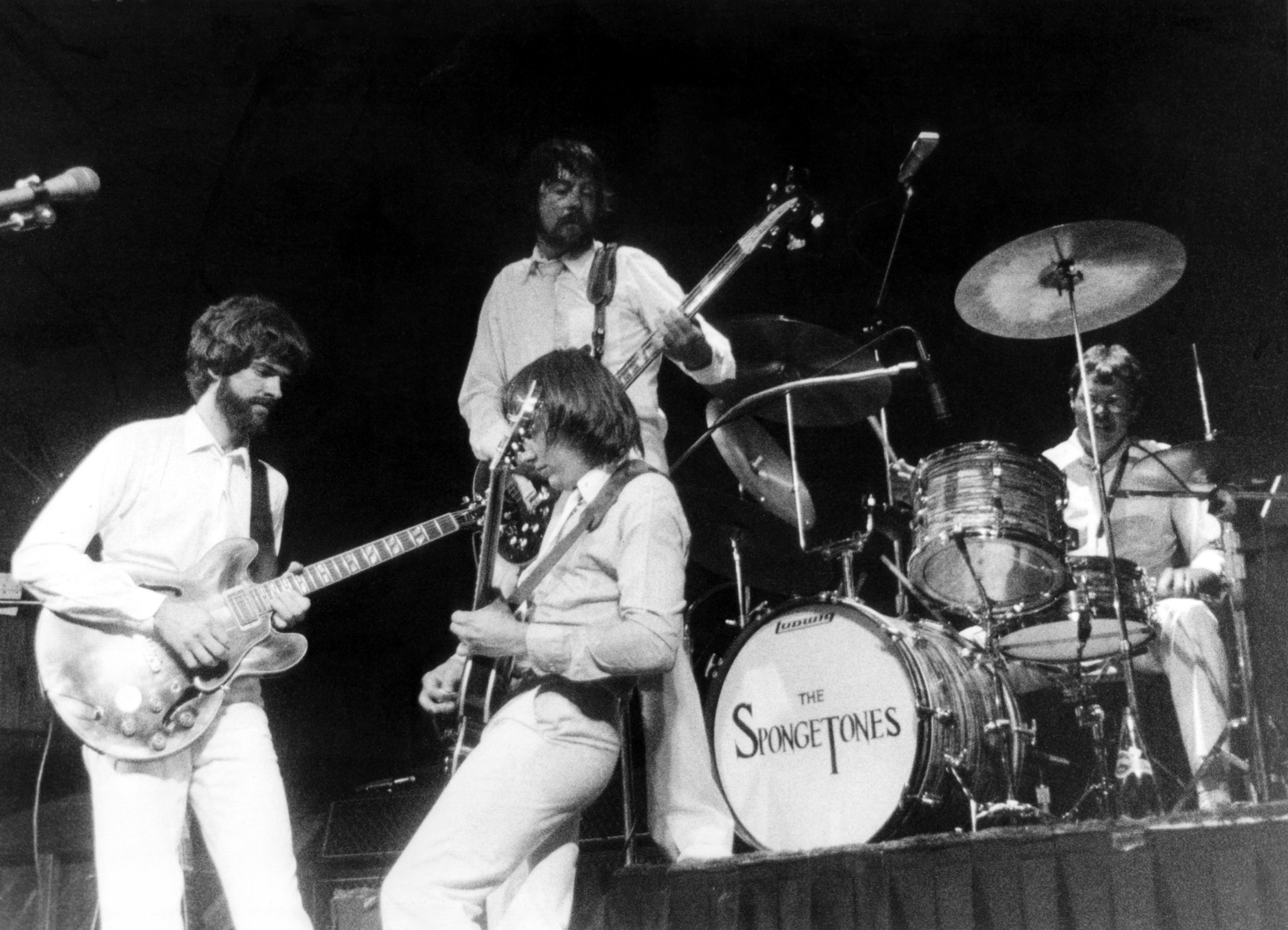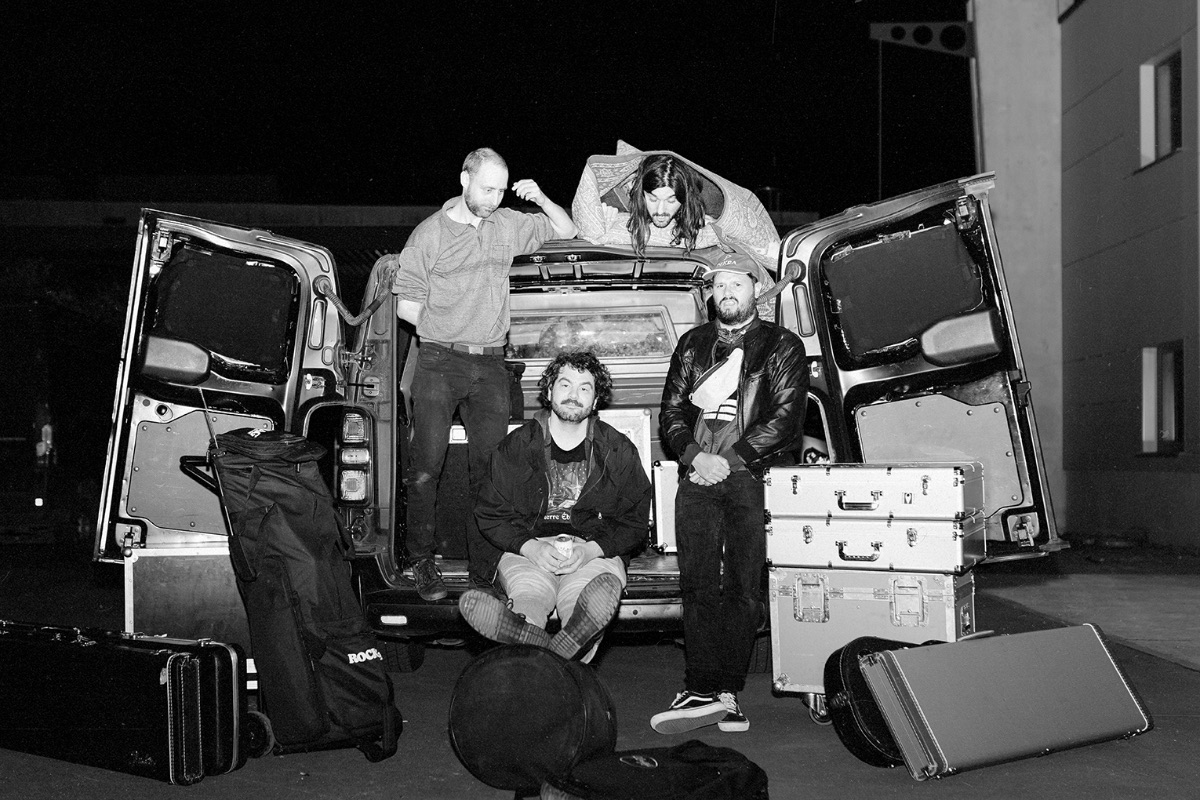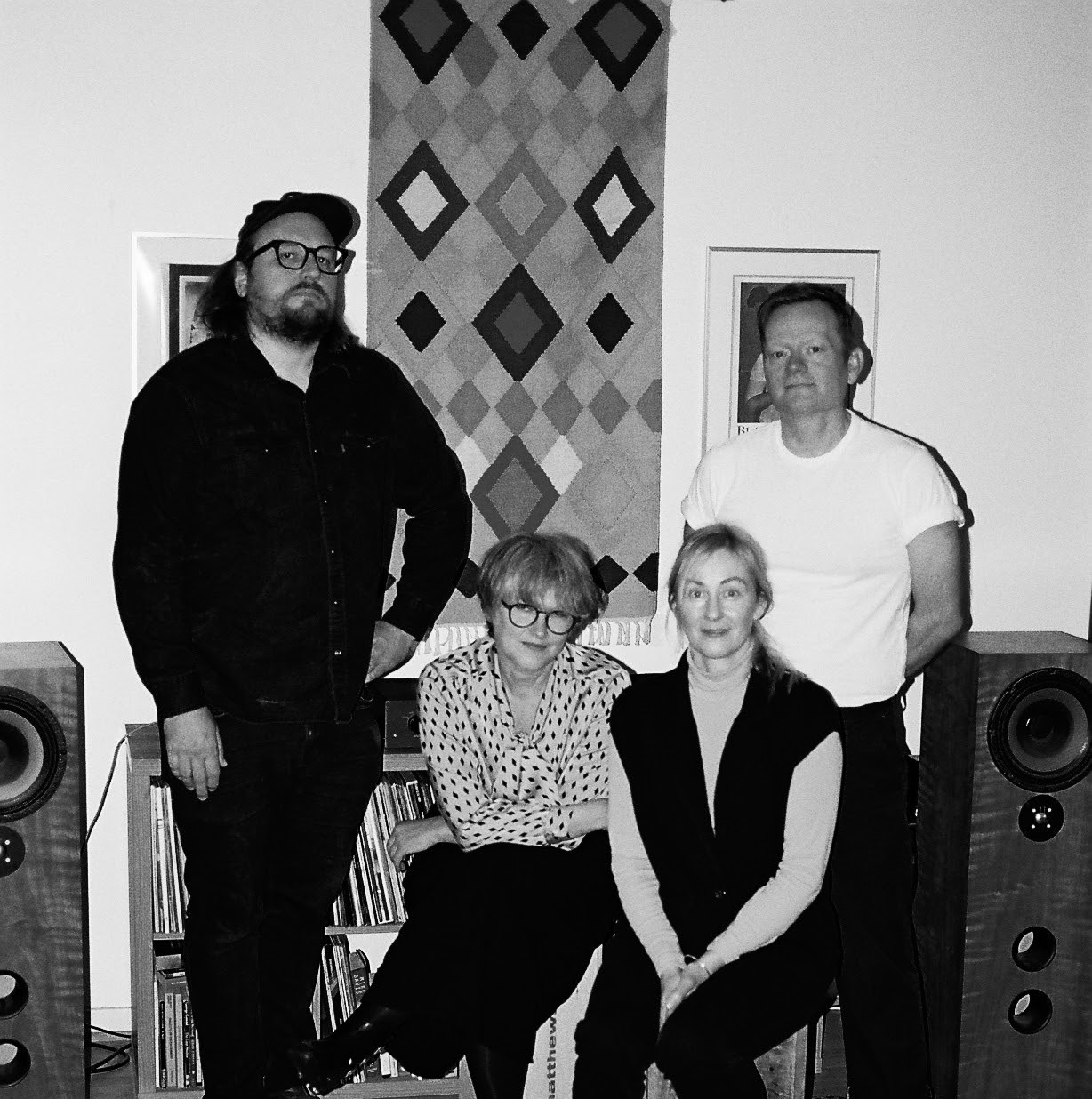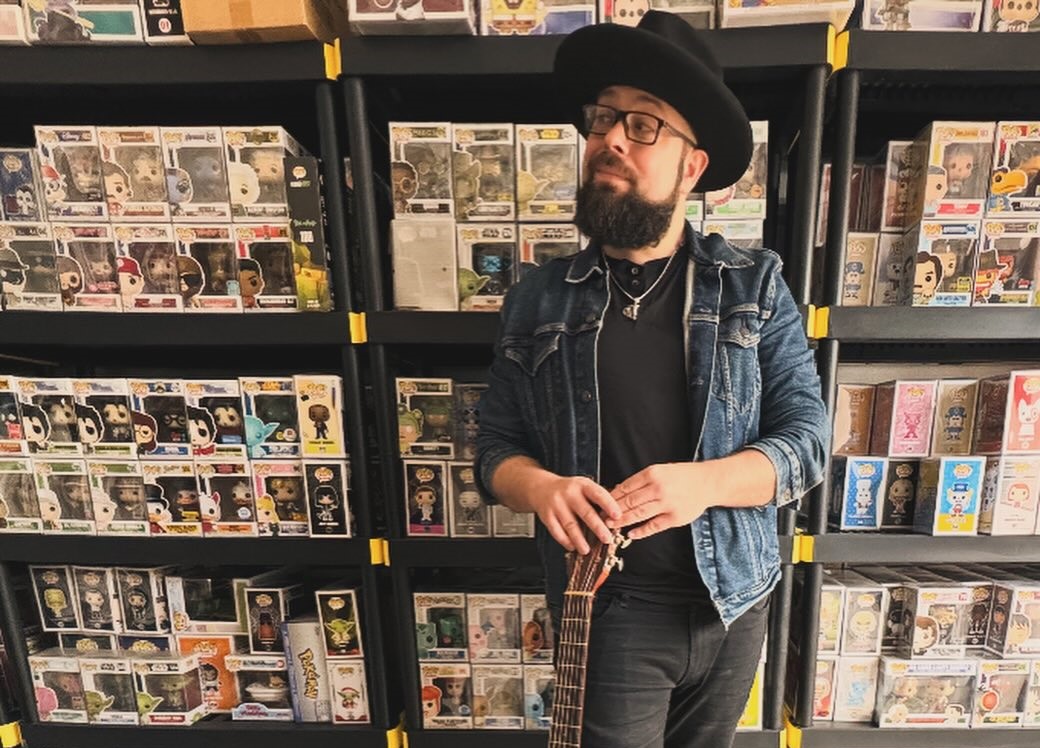The Spongetones | Interview | Steve Stoeckel | Debut Solo Album
‘The Power Of And’ is the long-awaited solo debut from The Spongetones founder Steve Stoeckel.
For decades, Steve Stoeckel has been penning and performing highlight compositions with his legendary band, on duo recordings with fellow Spongetone Jamie Hoover, and most recently as part of the far-flung collective POP CO-OP. That makes ‘The Power Of And’ a long-overdue opportunity for listeners to experience Stoeckel stretching out on a full-length LP under his own name. The songs on the album, galloping rockers and bucolic idylls alike, are textbook studies in heartfelt songwriting economy. Each one packs a stunning wealth of melody and strikingly original imagery and wordplay into their brief run times, with the full 15-track record clocking in at a breezy 37 minutes. There’s not a note or a word out of place and all of it’s instantly memorable, inviting another spin as soon as the pyrotechnics of the closing track end with a resounding bang.
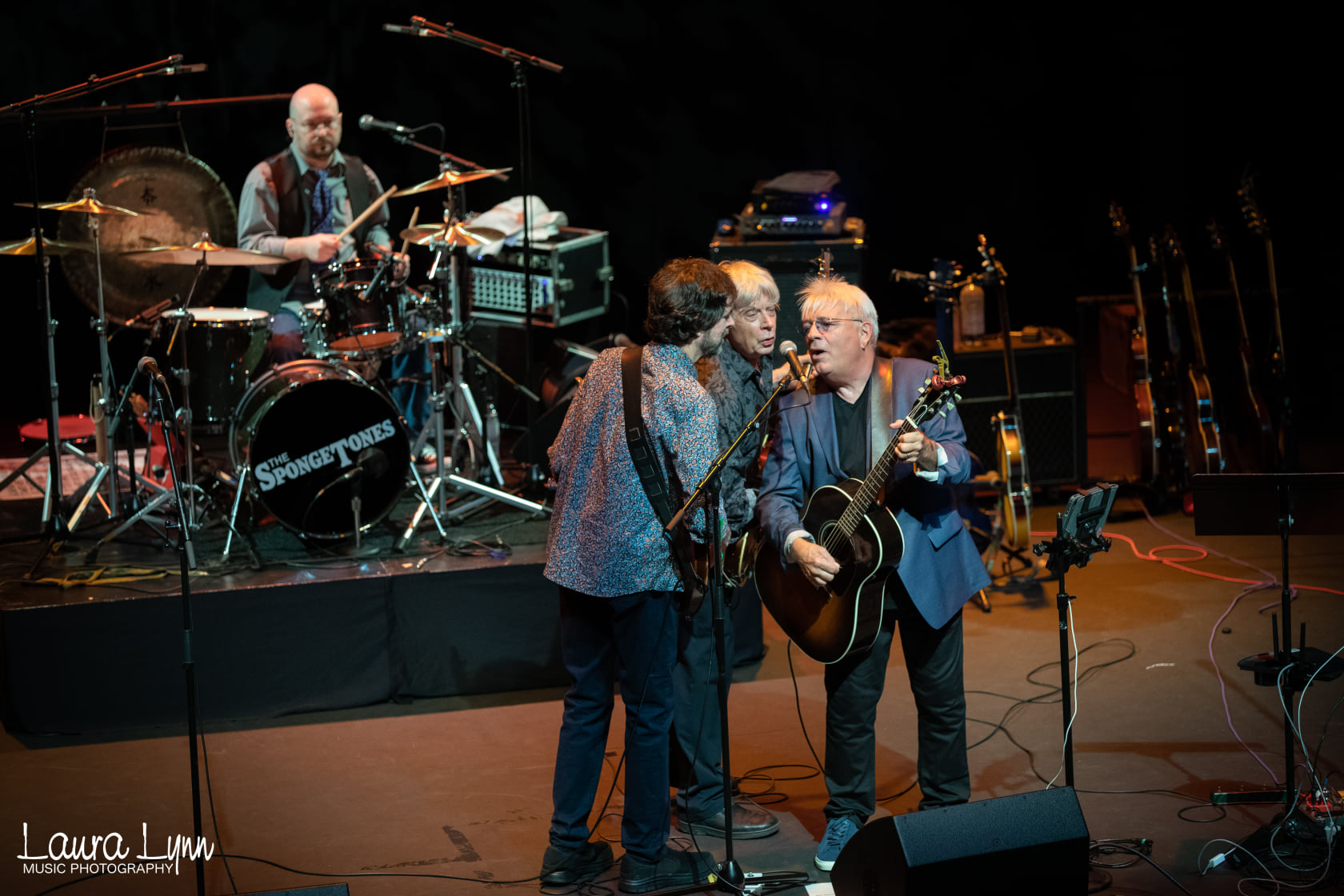
What is like to have your first solo album out after being a musician for so many years? Are you excited to play new songs live?
Steve Stoeckel: It’s exhilarating and a bit scary. I’ve gotten used to collaborating with very talented players, and also (in the early years) not being involved in the engineering and production in the studio. That last part is a separate skillset from songwriting, and something I learned mainly from being in the Spongetones with Jamie Hoover at the helm. The songs and the sound would be up to me, and that was something new.
Playing live? Interesting you would ask that. The band as such is mainly me on lots of these tunes. I used Eric Willhelm (The Spongetones) on drums for 5 songs. I had several great friends on guitar on many tunes: Pat Walters (The Spongetones) on one, Joel Tinnel (Pop Co-Op) on several, Rick McClanahan and Keith Shamel on some. David Harper on keys for 2 songs, and Michael Mitsch on pennywhistle. Some of these are local players, some not, so playing live would entail getting a band together. Coincidentally, I’m doing just that this summer; David Bash has invited me to play the Liverpool IPO at the Cavern Club. Eric is going as my drummer, Bill Kopp on keys, and a UK guitarist (Peter Watts, Spygenius band) who is also playing there has graciously offered to play guitar. I’m really excited about that!
How long did you work on ‘The Power of And’?
It was in bits and pieces. Big Stir expressed an interest in my doing a few singles (‘Why’ with Irene Pena and the ‘Birds’ solo). They liked those and suggested I think about a full CD, quite a daunting task. I had enough demos in the queue to start (I compose a lot here in my studio), so I finished those few and started writing, which went quickly-a few months. The hard part was getting good players for the real drums I needed on some songs (I program drums, which works on some things), the complex electric guitar parts I wanted for some of these tunes (I play bass and acoustic guitar mainly), and keyboards on others.
These players were so talented that it didn’t take long to get their takes. The mixing and production was the time-consuming part. Plus, I used another studio for the drums Eric played (I don’t have a large room to record drums. All total, composing, mixing, mastering, nearly a year).
Did you approach songwriting any differently as a solo artist?
Oh yes. I do love collaboration, which often makes the end result better, but the freedom of having total control is wonderful. A dual-edged sword: collaboration is often a way to really get ideas popping out, solo means you have to often work harder when the ideas aren’t coming. But I have all the time I need. Often I’ll just start banging guitar chords over a drumbeat and something will happen after 15-20 minutes; I’ll stop, dive in with lyrics. I’ve written some of the tunes on this CD that way, some in a matter of hours. It’s my time, so I can be as slow or fast as I like. Three of the 15 tunes on this CD have lyric co-writes with folks I’ve written with before.
Would love it if you could share some further words about how the album was recorded and produced.
I have a really good studio here, a small room that can handle one or two musicians other than myself. I have a nice vintage Ampeg bass amp and a Neumann U87 for vocals, but most of my effects/amplifiers/instruments are on my computer. I use the Cubase recording program. I start composing by laying down virtual drums (which may or may not be replaced with real drums), guitars, and bass. I then record lead vocals and backing vocals (which may or may not be replaced by other singers). I keep adding things-more parts, different effects, until the song takes shape. At this point, composing and producing are both running in my head. I try to listen to what the song is telling me-things about structure and also the sound.
When I have something concrete and I want other players, I may have them come here and lay tracks down. I’ll listen and give feedback until we have something that fits. I have the technology to also send them a music bed and if they have their own recording program, they can add parts and send them back to me, at which point I’ll add them to my session, perhaps enhancing the sound in my program. Then I’ll mix the entire song, balancing all the instruments and vocals, auditioning here with headphones, speakers, and finally in my car system. I have benchmark recordings of other music as sort of a reference to calibrate my ears.
Would you share your insight on the albums’ tracks?
Yes!
‘Laura Lynn’
This first started as a prequel to Costello’s ‘Alison’. I thought about how the relationship might have started to elicit this biting riposte from Elvis. So he loved her, wanted her and lost. I used Alison as the girl’s name, but I figured that would go nowhere. So I wracked my brain for a 3-syllable name (Vera Lynn was the closest, but still not right). Bruce Gordon was the one who suggested the perfect name ‘Laura Lynn’. Laura Tinnel is the wife of Pop Co-Op’s guitarist Joel Tinnel. Boom! I of course got permission from Laura and Joel to use the name.
‘Birds’
I started thinking about a couple arguing, not for the first time (I’ll add here that my wife Linda and I rarely do). He’s exasperated and just tries to distill it down. “We’re doing this again. These words are getting in the way. Here’s where we start. I love you. I need you. Only you. OK?” The sparse production of the song distills that.
‘If/Then’
This is me seeing the beginning of my life with Linda in one brief moment and thinking where would we be now if we hadn’t seen it? “If/Then” is also a computer programming thing, so the phrase was waiting for a song. Again, a sparse feel is required.
‘Mod Girl’
From a true story. I met a girl outside a nightclub in the late 60’s. She was dressed in Carnaby Street clothing and makeup. She asked me to walk her home and began to tell me about her life. We ended up in a dodgy part of town, and she showed me where she lived. “You see?” she said. She didn’t want to make out, just to talk.
‘Strange Cameo’
I wrote this in about an hour. I woke up from a dream about Rachel, a Facebook friend I’d not met. I was driving a car in heavy traffic, a bit stressed. Rachel was calmly giving me directions. That was pretty much it. When I woke, the title, most of the lyrics, and a bit of the melody were fully formed. I recorded much of it as it appears on the record, except Joel Tinnel’s wonderful solo, which was done later.
‘The Emerald Sea’
This started as a birthday song for Michael Mitsch, a friend who loves all things Irish, including his wife Trina. I used to write and post surprise birthday tunes on Facebook for friends. I sent this one to Michael, not telling him it was his birthday song, no lyrics, and asked him to play pennywhistle, which he did. I surprised him with it, of course, but I liked it so much I took out the “happy birthday” part and put it on the record.
‘The Power of And’
I’d had this one on a shelf for a while. It’s essentially a poem about the connective power of this little word, set to music. Simple but complex. Keith Shamel’s exquisite guitar parts raise it to another level.
‘Skippy’s Parade’
A nice silly bit of whimsy. Hardly anyone puts an instrumental bit on a vocal album anymore. A very Macca thing to do. A palate cleanser, if you will.
‘Christine’
I love songs about girl names. This one jumped out and wrote itself. Not about anyone in particular, just a rocker.
‘Why’
I wanted to do a male/female duet, and I love Irene Pena’s voice and songwriting. I sent her a music bed with verse lyrics and a story about (again) a couple’s conflict. I asked her for bridge lyrics and a vocal track, and boy did she nail it. This was another Big Stir single.
‘Just One Kiss’
Another one that came out nearly done in my head. I love ukulele, and laid it down with just uke and vocal first, and then really laid into it after the first verse with the full band. I like the ground this one covers, sweet to not-so-sweet.
‘Hummingbird’
Another quick one. I was dozing in my hammock and I heard a noise. I opened my eyes and saw a female hummingbird maybe 10 inches from my nose. I held my breath and stared, watching her just hover, moving slightly back and forth, and after what seemed like an eternity but was likely 8 seconds, she vanished. I spotted her up in a nearby oak tree. I went inside and recorded the song which, like a few others, is the version you hear on the CD.
‘The Monsters Under My Bed’
I’m a huge Maurice Sendak fan, and fell in love with Where The Wild Things Are the first time I read it to a child. It’s a reminder to keep my childlike nature close by. It’s invaluable for creating.
‘Heather Gray’
I was wearing a T-shirt that Linda informed me was the color “heather gray.” That sounded like a girl’s name, so I began writing the song. As I progressed, it became a story about someone I knew, who died during the song’s creation.
‘Whistling Past Graveyards’
A political song about a part of history which I wish I could forget, but can’t, and which I fear will repeat itself. Whatever concerns I had about mixing art with politics vanished with this.
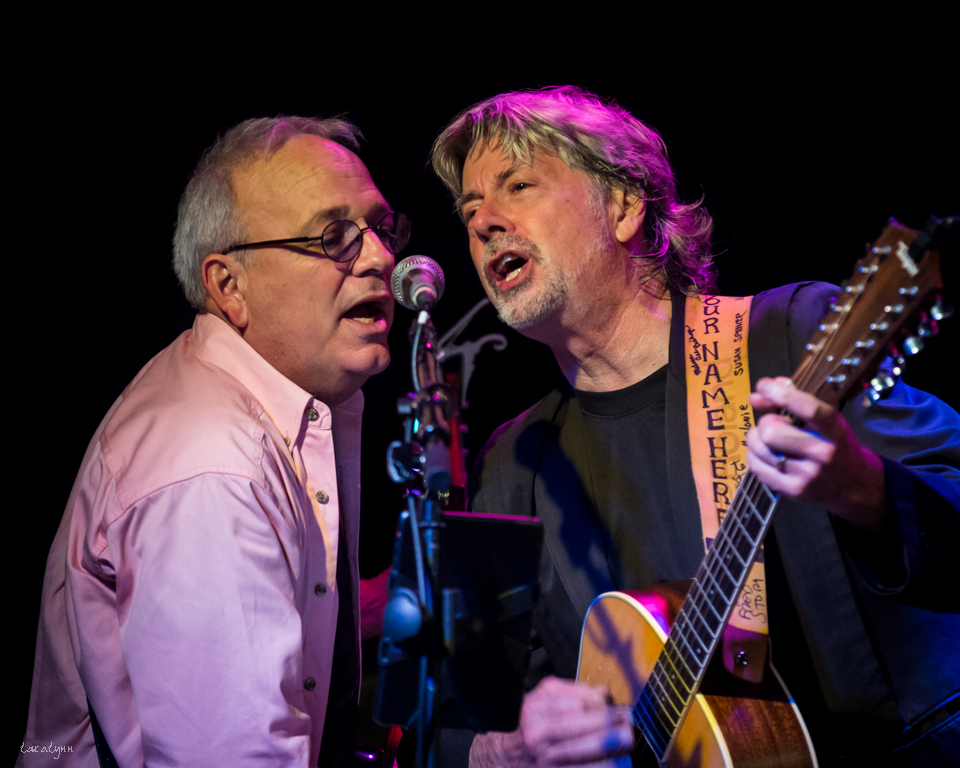
What clubs did the band play early on?
The first one-nighter was at The Hitching Post. Later, The Double Door Inn, Kidnapper’s, The Yellow Rose, where we developed a following. All these and other early clubs have vanished. Great times, and large crowds, hundreds of folks packing the place, singing along.
Let’s move back in time. What was it like growing up for you? Do you have any special places where you and your friends hang out and talk music?
I started at the age of 16 in a garage band with a guitarist friend on my street, who was already learning The Beatles’ songs. We formed a band and played parties. I began playing professionally in the 70’s in cover bands. I have so many musician friends. We hang out at each other’s houses, at parties, even take vacations together, and music is always the main topic of conversation. Facebook has been a great hangout place also, so many chats (many of which have led to songs).
Can you elaborate on the formation of The Spongetones?
Ah, The Spongetones. I got a call in 1978 from Pat Walters, another player from my childhood neighborhood (we went to Jr High School together), who had gone on to play in lots of bands around the county by then. “We’re putting a Beatles band together for one night and your name came up.” Of course I said yes. We rehearsed and played that gig for maybe 30 people at a local club. The Beatles’ music had been off the charts for quite some time by then, but it was just starting to experience a revival, and we didn’t know it. In a few years we were playing to packed clubs. Then came the records, and after 45 years, here we still are, I had no idea. And that’s one reason I have a solo CD. That started my songwriting, recording, and producing.
Listening today to those early albums like, ‘Beat Music,’ ‘Where-Ever-Land,’ and ‘Oh Yeah!,’ what runs through your mind?
I do listen to those occasionally. So many memories come back-being that young, watching it unfold in the studio (especially “Beat Music,” which was the first real recording session for me and my first songwriting). We were so young. I’m pleased to listen and see it still holds up. A reminder of how lucky I was to get that call.
What clubs did the band play early on?
The first one-nighter was at The Hitching Post. Later, The Double Door Inn, Kidnapper’s, The Yellow Rose, where we developed a following. All these and other early clubs have vanished. Great times, and large crowds, hundreds of folks packing the place, singing along
There are now many bands that managed to produce such wonderful numbers as those that appeared on ‘Beat & Torn’. How do you think you managed that?
Again , it was an intersection of talent (the songwriting, the production of Jamie Hoover and the engineering of Mark Williams) and the lack of timing, I think.
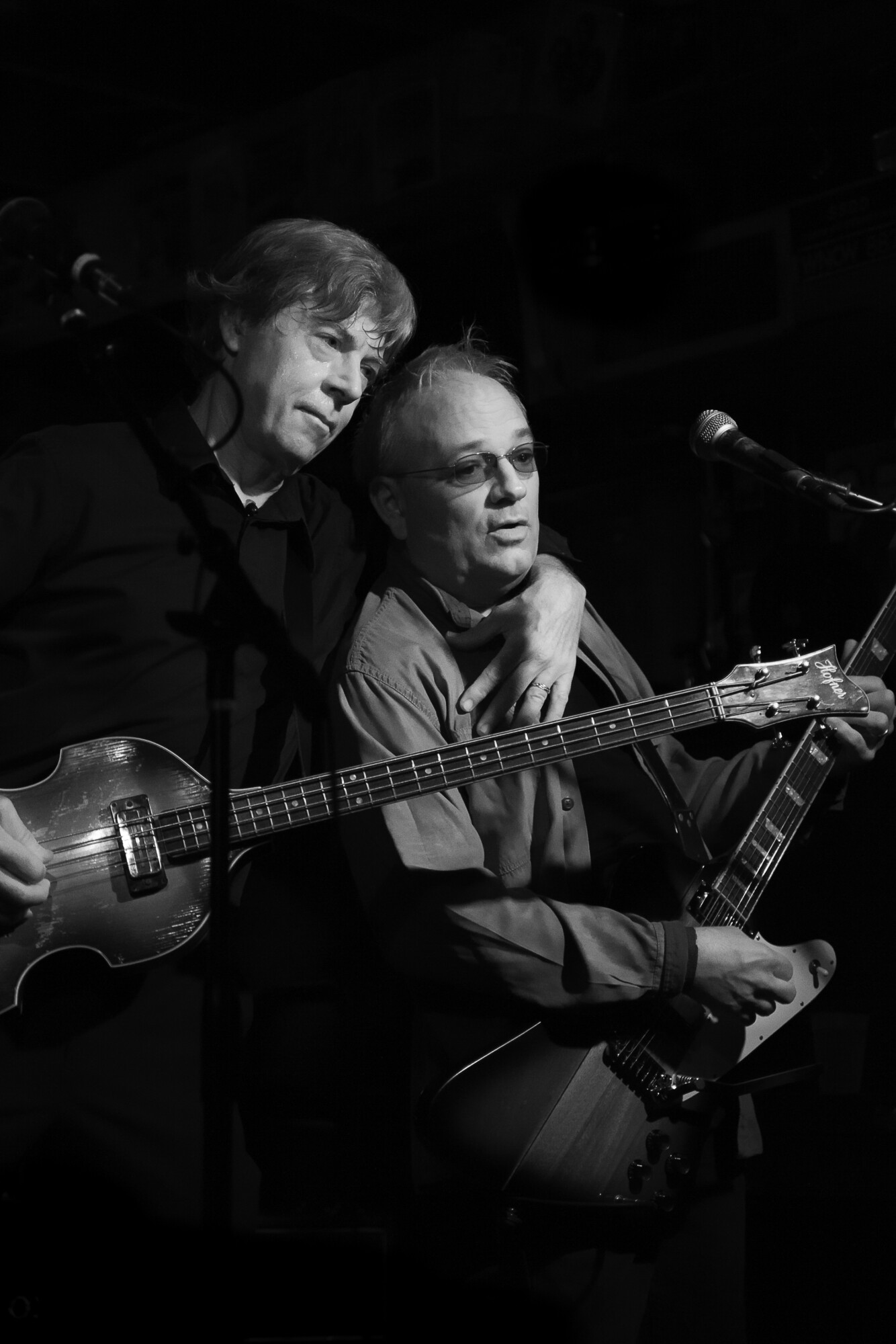
Tell us about the effects, pedals and gear you used?
A Hofner Beatle bass, Hofner and Casino guitars of course. I use just a compressor on my bass (live and recording). An Ampeg B 15 amp for bass.
How did you decide to work as a duo with Jamie Hoover?
After The Spongetones last record ‘Scrambled Eggs,’ Jamie and I had many tunes which didn’t make it onto that record, so we started a duo. We work very quickly with just the two of us. We each have the same recording program, and by then I’d become adept at using it with Jamie’s mentoring. Jamie also plays drums, so it was all self contained. We put out several records which were received well, and performed as a duo for a while
You’re also active today with Pop Co-Op. Tell us about your recent 2022 album.
Another great collaboration: 4 guys who all compose, record, and produce. So easy to work with (the thought of this many guys doing all that would scare an outside producer). ‘Suspension’ was our third and I think our best CD. Everything on this one works; we got the collaborative flow down perfectly. I’m very pleased with this one and the reception it got.
What are some future plans?
I have enough tunes written for at least 3 more solo CDs, and I write nearly every day, so as long as Big Stir can fit me in their rollouts, I’m happy (they do have a big roster with lots of artists in the queue, so it will be a while). I am reaching out to a few new folks for collaboration in the meantime. I just can’t sit still. Audio Determination Disorder: I’ll Coin that!
Let’s end this interview with some of your favourite albums. Have you found something new lately you would like to recommend to our readers?
‘Oranges & Lemons’ and ‘Skylarking’ by XTC, (heck, anything XTC). ‘Argybargy’ by Squeeze (heck anything by Squeeze)… ‘Bellybutton’ by Jellyfish, ‘Bookends’ by Simon and Garfunkel, ‘Seconds of Pleasure’ by Rockpile… Hard to choose. These are ones I liked at first listen.
New? I’m liking The Beths a lot. Lake Drive Band. Any good new pop stuff-I’m that kind of guy. I’m liking lots of stuff from folks I’ve met on Big Stir: Chris Church, Dolph Chaney, Bill Lloyd (long time pal). Jamie Hoover has been producing a lot of new music down in Southport that’s excellent. So much coming out on the indie stations. It’s a good feeling.
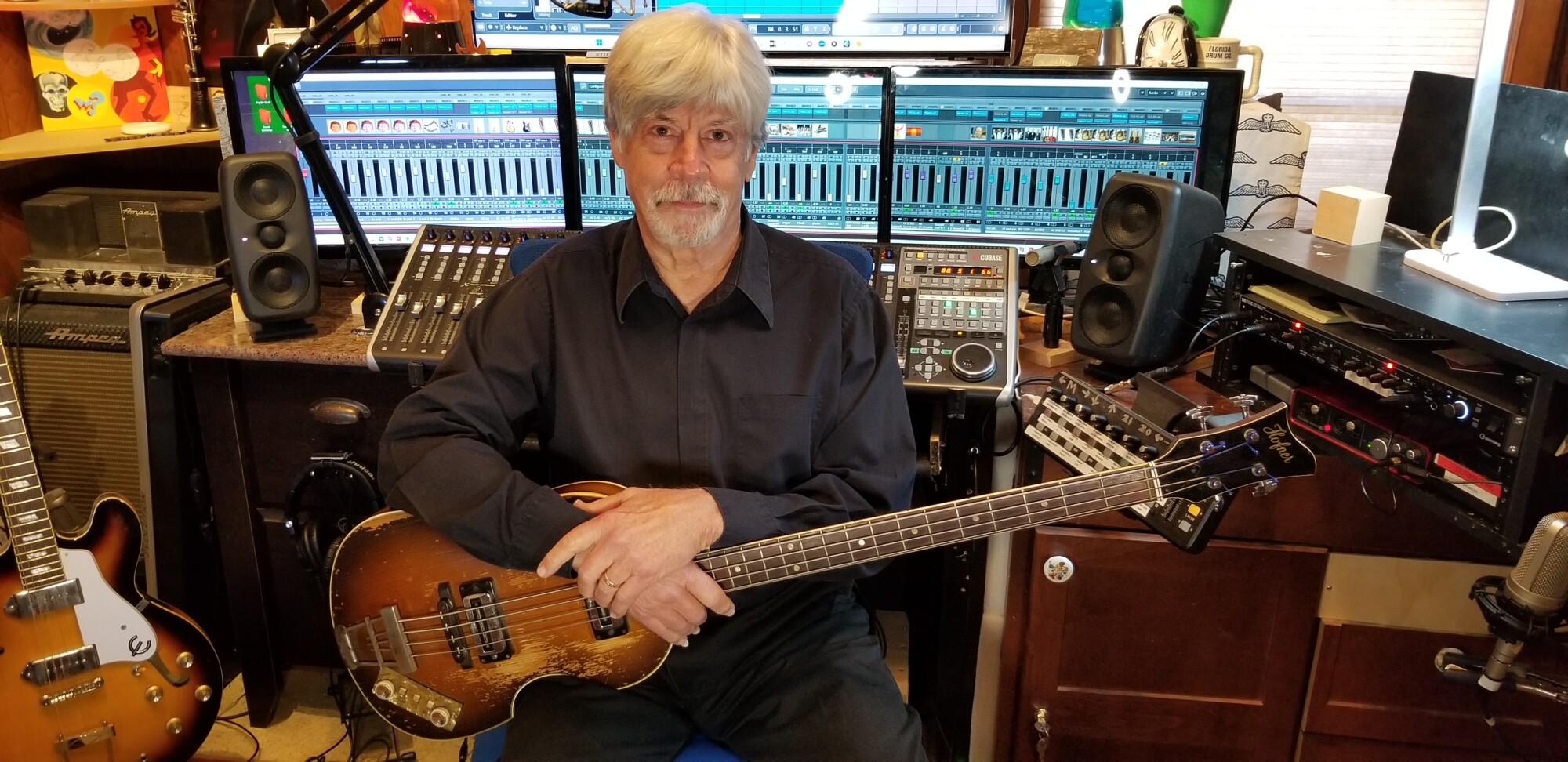
Thank you. Last word is yours.
Thanks for great questions. I’ll add that I’m most grateful for the attention this record is getting (including of course this interview). I don’t take anything for granted. I released it with a bit of a “Gulp! If it tanks, no one to blame but me…” I’m sure I’m not the first one to feel that. I try not to over or underestimate my skills, and this is another recalibration for me.
Klemen Breznikar
Headline photo: The Spongetones
The Spongetones Official Website / Facebook
Big Stir Records Official Website / Facebook / Instagram / Twitter / Bandcamp / YouTube

